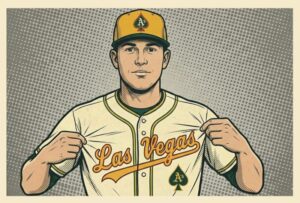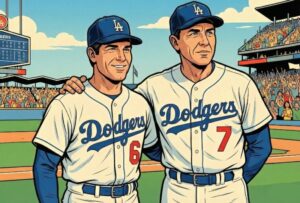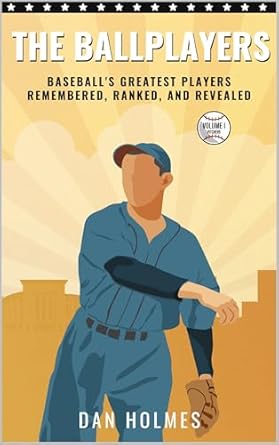Imagine you’re at the ballpark watching your favorite major league team and then you hear a voice over the PA system. The voice apologizes and then lambasts the team for their shoddy play. It’s the voice of the owner of the team and he’s speaking to you during the game.
Seems pretty unbelievable right? But that’s exactly what happened on Opening Day in San Diego in 1974 when a millionaire owner aired his grievances over the microphone while a stunned crowd listened.
Ray Kroc was 72 years old, the mega-millionaire owner of McDonald’s restaurants, and a savior in San Diego when the Padres started the ;74 season. Earlier in the spring the team had nearly been sold to another ownership group who planned to move the franchise east to Washington D.C. Then Kroc stepped in and rescued the team, keeping it in sunny southern California. When he went on the field for pre-game opening day festivities, Kroc was applauded by the crowd at San Diego Stadium.
But once the game started, it didn’t take long for the outspoken owner to become displeased. The visiting Houston Astros plated three runs in the first inning, three more in the second, and led 9-2 in the 8th inning, thanks in part to three errors and a passed ball by Kroc’s Padres. That’s when Ray grabbed the mic.
“I suffer with you,” he blurted out to the more than 39,000 in attendance.
At that moment, almost unbelievably, a nude man ran onto the field.
“Get that streaker out of here and throw him in jail!” Kroc raged.
As the crowd tried to make sense of what was happening, Kroc continued with his spontaneous ad-lib monologue.
“I have some good news and bad news, ” he announced. “The good news is that we’ve outdrawn the Dodgers. They had 31,000 for their opener, and we have 39,000 for ours.
“The bad news is that I’ve never seen such stupid ball playing in my life.”
It was a spur-of-the-moment, head-scratching performance worthy of Clint Eastwood.
When he bought the team for $12 million, Kroc explained he made the deal because, “I needed a hobby.” No one knew the hobby was going to be amateur stand-up comedy.
The Padres players may have been stunned or they made have been pissed, but whatever they were, they responded by scoring three runs. Still, they lost the game 9-5, lowering their record to 0-4.
Obviously the team wasn’t amused by Kroc’s audio commentary.
“I’ve never heard anything like that in my 19 years in baseball,” Padre slugger Willie McCovey said. “I wish Mr. Kroc hadn’t done that. None of us like being called stupid and we’re trying to do the best we can.”
Kroc apologized after it was explained to him what a crazy old man he was, but the Padres kept losing: falling to 0-6 and eventually losing 13 of their first 16 in the Kroc Era. It was a weird, pathetic start to the season. At one point the team started a game 35 minutes late when the sewers backed up in the ballpark. Strangely, the ballplayers shrugged it off. Maybe they were used to bullshit.
– – – – – – – – –
By the early 1970s, there had been several great players who had worn the uniform of the San Diego Padres. Ted Williams, for example. Unfortunately for the MAJOR LEAGUE Padres who were born in 1969, those players had played for the minor league Padres. Those Padres were one of the better teams in the Pacific Coast League for decades, so when MLB awarded a franchise to San Diego in ’69, the familiar name was chosen.
But just because the new Padres were major league, didn’t mean they were run that way.
Things got off to a bad start when the team arrived at the expansion draft, which was held on October 14, 1968 in New York at the Waldorf Hotel. Team officials quickly realized they had left their paperwork – all of the scouting reports on the players they wanted to draft – in a taxicab. A few anxious moments passed while the officials from the Montreal Expos waited. Finally, the embarrassed Padres employees located their briefcases and the draft began.
It didn’t really matter much what order they selected their players in that draft, because in their first season the team lost 110 games and finished miles behind the Atlanta Braves in the NL West. In an almost unbelievable stretch of losing, the Pads lost 62 out of 75 games from early June to late August in that initial season. Presumably, most San Diegans were too busy suntanning to notice.
The Padres somehow managed to avoid losing 100 games in their second season, dropping 99. They averaged 101 losses per year in their first six seasons, finishing dead last every time.
This was the team that Kroc bought – that he rescued. What he saw in them is a mystery. Maybe he just wanted a forum for his senility.
– – – – – – – – –
One of the knocks on the Padres for years was that the weather was too nice and there were too many attractive distractions in beautiful in San Diego, and therefore it was an atmosphere more conducive to beach volleyball than baseball. There might have been a lot of truth in that argument, at least in the early years.
Immediately – in season #1 – the Padres were a mess at home. They lost 16 of 18 games at home in one stretch. It seemed the players – and maybe even the skipper- were distracted by the easy life style in sunny SoCal.
Sparky Anderson was a coach under manager Preston Gomez that season. The white-haired Anderson was still a year away from getting his break to manage the Cincinnati Reds. During his one season in San Diego, Sparky witnessed a lot of losing, and a lot of stuff that made him wonder.
“[We] weren’t a good team,” Anderson later said. “I don’t know if Preston and some of his friends on the staff even paid much attention during some of the games, [they] seemed ready to get into their golfing shoes.”
If Gomez was a part-time manager, he had friends in the front office, because he managed the Padres for three full seasons and started a fourth.
Gomez could never be accused of being sentimental. On July 21, 1970, Padres pitcher Clay Kirby was pitching a no-hitter against the New York Mets at San Diego Stadium when Gomez removed him from the game for a pinch-hitter in the 8th inning. The Padres were trailing 1-0, but the move was still curious and it didn’t sit well with a startled Kirby, who watched a relief pitcher allow two runs in the 9th. Later, when he was managing the Houston Astros, Gomez removed Don Wilson in the 8th while he was tossing a no-hitter.
After the team got off to a 4-7 start in 1972 they axed Gomez and replaced him with Don Zimmer, who was getting his first crack at managing a big league club. Zimmer, in what would become a theme in his career, promised to instill toughness and fundamentals.
“We’re going to hold as many workouts as we need to learn how to play the game the right way,” Zim said through his tobacco-distorted face. Apparently the “right way” didn’t include a lot of victories, as the team continued to drag along in ’72 under their new manager. After the Pads lost 16 of 17 in late May and early June, they were buried in their customary last place. Under the enthusiastic and fiery Zimmer the club started to use the hit-and-run, stolen base, and sacrifice much more, but the losses still piled up. President and GM Buzzie Bavasi strained to find a silver lining.
“We’ve become a lot more interesting to watch,” he said.





